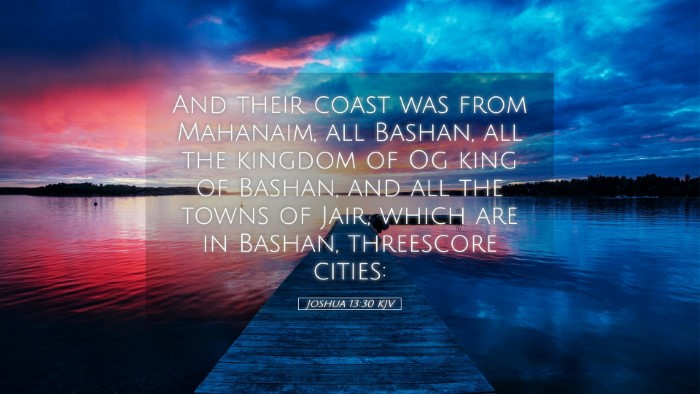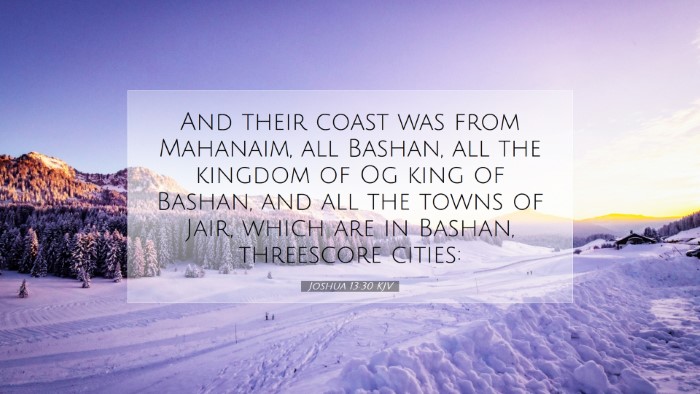Commentary on Joshua 13:30
Introduction
The verse Joshua 13:30 reads: "And half Gilead, and the region of the Geshurites and Maachathites, which was called the land of the giants." This passage is part of the broader narrative concerning the distribution of the Promised Land among the tribes of Israel. In this commentary, we will explore historical contexts, geographical significances, and theological implications drawn from respected public domain commentaries by Matthew Henry, Albert Barnes, and Adam Clarke.
Historical Context
Joshua, a key figure in the conquest of Canaan, receives directions from God for the allocation of land to the Israelite tribes following their acquisition of Canaan. This particular verse identifies territories that remained to be assigned, specifically half of Gilead and regions associated with the Geshurites and Maachathites. According to Matthew Henry's Commentary, these lands were not only strategically relevant but also carried stories of the giants who formerly inhabited them, thus reminding Israelites of God's victory over formidable enemies.
Geographical Significance
Albert Barnes notes that Gilead was known for its rich pastures and strategic location, being positioned east of the Jordan River. The Geshurites and Maachathites were peoples who lived in close proximity, and their inclusion indicates the broader context of Canaan's diverse inhabitants. This strategic geography enabled Israel to not only position themselves for defense but also leverage trade and agricultural prosperity.
- Gilead: This region was recognized for its beauty and fruitfulness, situated in a mountainous area conducive to livestock.
- Geshurites: A people group known for their distinct culture and resistance to domination, they represented the ongoing challenges Israel faced in securing their land.
- Maachathites: A smaller tribe, yet they played a significant role in the region’s history and dynamics.
Theological Implications
This verse, while historical, mirrors a wider theological narrative regarding God's promises to His people. Adam Clarke emphasizes the notion of fulfilling divine promises in a physical and spiritual sense; the land granted to the Israelites was a manifestation of God's covenant with Abraham. Each geographic allocation served as a testament to God’s faithfulness and the necessity of obeying His commands in order to receive blessings.
Furthermore, the mention of "the land of the giants" carries profound implications. It reflects not only on the physical challenges faced by Israel but also symbolizes spiritual adversities. The reference points towards the need for continuous reliance on God’s strength when confronting the 'giants' in life. These giants can express various forms, including sin, temptation, and external oppositions to faith, underscoring the need for perseverance and trust in divine providence.
Spiritual Reflection
As past leaders and scholars pondered this verse, it became clear that Joshua 13:30 serves as a reflective passage for modern believers. Just as Israel was tasked with the responsibility of claiming their inheritance, Christians today are called to claim the promises of God and stand firm against seemingly insurmountable challenges. Matthew Henry vividly remarks on the overarching presence of God as a source of confidence, prompting believers to trust that what may appear as a giant is, in fact, an opportunity for God's power to be displayed.
Practical Application
In conclusion, Joshua 13:30 is not merely a historical footnote but is rich with significance for contemporary faith practices. For pastors, this verse can invigorate teaching on God's faithfulness and the courage to confront life's 'giants' based on faith. For students and theologians, it provides a framework for understanding God's historical relationship with His people and the implications for personal Christian living.
- Student Reflection: Consider the 'giants' in your life that may deter your spiritual journey and how you can seek God's help to confront them.
- Pastoral Application: Use this text to encourage congregations about possessing their spiritual inheritance through faith and obedience.
- Theological Discussion: Analyze the role of geographical inheritance in relation to divine promises across scripture.


